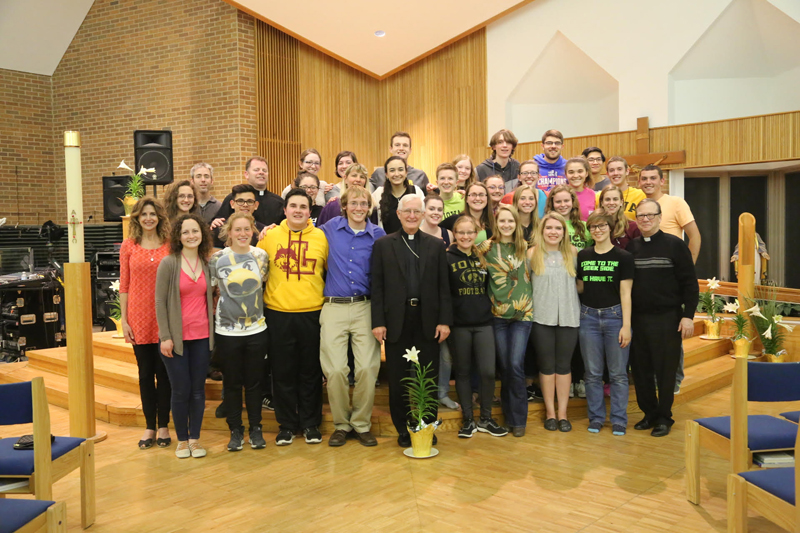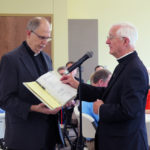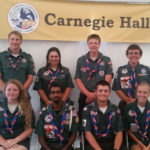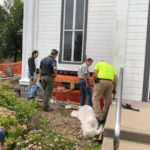By April Rouner
For The Catholic Messenger
In a Jan. 13 letter addressed to the youths of the Catholic Church (ages 16-29), Pope Francis asked them to tell him, their bishops and pastors about their hopes and struggles and even their criticisms.

Members of the Newman Catholic Student Center at the University of Iowa in Iowa City pose for a picture with Bishop Martin Amos during a dialogue at Newman Center April 20. Also pictured are Fathers Jeffry Belger and Steve Witt.
In preparation for an October 2018 meeting of the Synod of Bishops focused on youth, the pope wrote that the church wants “to listen to your voice, your sensitivities and your faith, even your doubts and your criticism. Make your voice heard. Let it resonate in communities and let it be heard by your shepherds of souls.”
The pope’s letter was released along with a preparatory document of questions for the “Young People, the Faith and Vocational Discernment” synod gathering. Responses from national conferences of bishops, other church bodies and youths will form the basis of the synod’s working document. Pope Francis will formulate a decree from the document’s findings.
Laurie Harris, executive director of the Newman Catholic Student Center at the University of Iowa, invited Bishop Martin Amos, apostolic administrator of the Diocese of Davenport, to meet with the center’s students on April 20 to solicit input for the synod. Harris said, “We want to ensure Iowa student voices are heard in Rome at the synod, to empower these young adults to be the voice of change.”
Before fielding students’ input, Bishop Amos shared, “Through the synod, the church will examine itself on how we can lead young people to recognize and accept the call to the fullness of life and love. We will ask young people to help in identifying the most effective ways to announce the Good News today. The church understands that we need to evaluate our pastoral approach to young people living in a rapidly changing world where globalization, technology, as well as economic and social hardships, pose significant challenges to discovering your vocational path. How these factors impact your faith requires greater listening, respect and dialogue.”
Discussion at the Newman Center forum revolved around the central question: “What does God want you to do?” The students were also asked to explore the process by which a person makes fundamental choices for vocational and professional life.
Students shared that one of the major challenges for young people is defining their personal identity and finding their path in life with countless options (or lack thereof) available. To help young people become “agents of change,” the church should address gender inequality and discrimination against ethnic or religious minorities, world tension and extreme political polarization, and a culture of individuality.
Inclusiveness, guidance and the need for more knowledge of the ways and teachings of the church were three major themes identified throughout the hour-long forum.
The bishop’s parting question: “What opportunities have you experienced in college that have made a difference to you?” Jasmine Tone, a senior from Mount Pleasant, said, “Retreats and service trips through the Newman Center have allowed me to expand my horizons … they have really ignited my faith.”
Andrew Kordick, a freshman from Hospers, Iowa, said: “We know students in the U.S. are more privileged than others of our age in the world. We are grateful for our opportunities.” Many students nodded in agreement. “We don’t want the church to take control of our faith, but we do want it to keep us growing in our Catholic faith,” they said. “Keep us involved.”
(April Rouner is director of development for Newman Catholic Student Center in Iowa City.)











